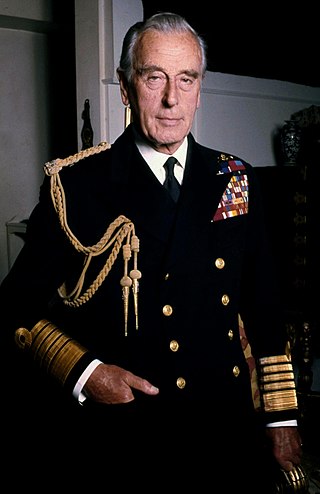
Louis Francis Albert Victor Nicholas Mountbatten, 1st Earl Mountbatten of Burma, commonly known as Lord Mountbatten, was a British statesman, Royal Navy officer and close relative of the British royal family. He was born in the United Kingdom to the prominent Battenberg family. He was a maternal uncle of Prince Philip, Duke of Edinburgh, and a second cousin of King George VI. He joined the Royal Navy during the First World War and was appointed Supreme Allied Commander, South East Asia Command, in the Second World War. He later served as the last Viceroy of India and briefly as the first Governor-General of the Dominion of India.

Shashi Kapoor was an Indian actor and film producer who is best known for his works in Hindi films. A recipient of several accolades, including four National Film Awards and two Filmfare Awards, he also featured in a number of English-language international films, particularly films produced by Merchant Ivory. The Government of India honoured him with the Padma Bhushan in 2011, and the Dadasaheb Phalke Award, in 2014, for his contribution to Indian cinema.

Jayaprakash Narayan Srivastava, also known as JP and Lok Nayak, was an Indian politician, theorist and independence activist. He is mainly remembered for leading the mid-1970s opposition against Prime Minister Indira Gandhi and calling for her overthrow in a "total revolution". In 1999, Narayan was posthumously awarded the Bharat Ratna, India's highest civilian award, in recognition of his social service. His other awards include the Magsaysay award for public service in 1965.
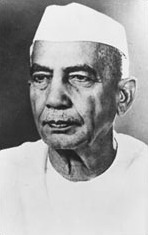
Chaudhary Charan Singh was an Indian politician, peasant leader and a freedom fighter who briefly served as the prime minister of India from July 1979 to August 1979. Singh was principally known for his land and agricultural reform initiatives was Member of Parliament (MP) for Baghpat. During prime ministership he was a member of the Janata Party (Secular). He served as the chief minister of Uttar Pradesh as a member of Bhartiya Kranti Dal. He also briefly served as the deputy prime minister of India from January 1979 to July 1979 as a member of the Janata Party. Singh is widely regarded as the "Champion of Farmers", after his life has been dedicated to advocating for the well being and rights of farmers.

Chiranjeevi is an Indian actor, politician, and philanthropist known for his work in Telugu cinema. Known as the "Mega Star", he is widely regarded as one of the most successful and influential actors in the history of Indian cinema. Chiranjeevi holds the record for the most "Industry Hits" in Telugu cinema, with eight films emerging as the top-grossers of their time—a feat unmatched by any actor in the industry's 100-year history. He is also celebrated as one of the finest dancers in Indian cinema. He has received numerous honours, including the Padma Bhushan in 2006 and the Padma Vibhushan in 2024 from the Government of India, as well as the IFFI Indian Film Personality of the Year Award in 2022. His other accolades include the Raghupathi Venkaiah Award, three Nandi Awards, and nine Filmfare Awards South, including the Lifetime Achievement Award. In 2013, CNN-IBN recognized him as one of "the men who changed the face of the Indian Cinema". In 2024, he was honoured with a Guinness World Record as the most prolific actor-dancer in the Indian film industry.
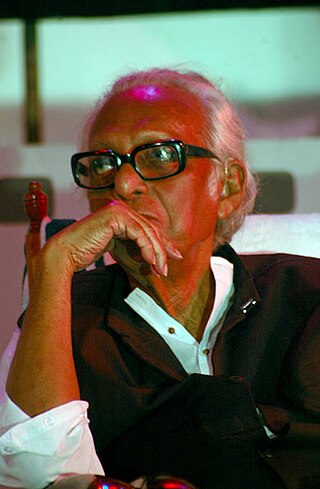
Mrinal Sen was a Bengali film director and screenwriter known for his work primarily in Bengali, and a few Hindi and Telugu language films. Regarded as one of the finest Indian filmmakers, along with his contemporaries Satyajit Ray, Ritwik Ghatak, and Tapan Sinha, Sen played a major role in the New Wave cinema of India. He also served as the President of FTII from 1984 to 1986.

Satish Dhawan was an Indian mathematician and aerospace engineer, widely regarded as the father of experimental fluid dynamics research in India. Born in Srinagar, Dhawan was educated in India and further on in United States. Dhawan was one of the most eminent researchers in the field of turbulence and boundary layers, leading the successful and indigenous development of the Indian space programme. He succeeded M. G. K. Menon, as the third chairman of the Indian Space Research Organisation (ISRO) in 1972. The second launch pad of ISRO, Satish Dhawan space centre is named after him. He is greatly regarded as the man behind A. P. J. Abdul Kalam.
Srinivasaraghavan Venkataraghavan (, also known as Venkat, is an Indian former international cricketer and umpire. He was a right arm off break bowler and a lower order batter. He captained the Indian cricket team in test cricket and also at the first two ICC Cricket World Cups in 1975 and 1979. He represented Tamil Nadu and South zone in domestic cricket while also playing for Derbyshire in English county cricket from 1973 to 1975.

Nandamuri Balakrishna , also known as Balayya or NBK, is an Indian actor, film producer and politician known for his works in Telugu cinema. Balakrishna is an elected member of the Andhra Pradesh Legislative Assembly from Hindupuram constituency since 2014. The sixth son of actor and former Chief Minister of Andhra Pradesh N. T. Rama Rao, Balakrishna made his debut as a child artist at the age of 14 with the film Tatamma Kala (1974). Balakrishna is a recipient of three state Nandi Awards, three SIIMA Awards, and an IIFA Award. In 2012, Balakrishna was the chief guest at the 43rd IFFI. Currently, he serves as the Chairman of Basavatarakam Indo-American Cancer Hospital and Research Institute in Hyderabad.

Jagjivan Ram, popularly known as Babuji, was an Indian independence activist and politician who served as a minister with various portfolios for over 30 years, making him the longest-serving Union Cabinet minister in Indian history. He also served as the Deputy Prime Minister of India from January 1979 to July 1979. He played a pivotal role as the Defence Minister of India during the Indo-Pak War of 1971, which led to the creation of Bangladesh. As Union Agriculture Minister during two separate tenures, he contributed significantly to the Green Revolution and the modernization of Indian agriculture, particularly during the 1974 drought when he was entrusted with addressing a severe food crisis.
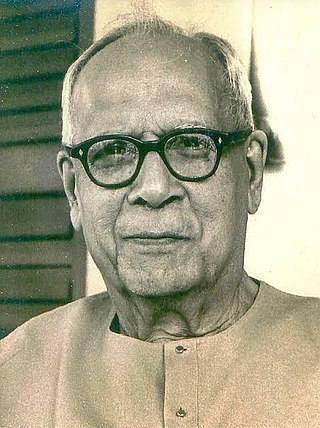
Ramesh Chandra Majumdar was an Indian historian and professor known for promoting Hindu nationalist views. He principally studied the history of India.

Irruppam Veedu Sasidaran was an Indian film director who made over 110 films predominantly in Malayalam, in addition to Tamil and Hindi languages. In 2015, he was awarded the J. C. Daniel Award, the highest award in Malayalam cinema. Often described as a pathbreaker, Sasi made his mark during Malayalam cinema’s transformative period from the 1970s to 1990s.

Nagoor Saheb, known by his stage name Mano, is an Indian playback singer, voice-over artist, actor, and composer. Mano has recorded more than 35,000+ songs for film and private various Telugu, Tamil, Bengali, Kannada, Malayalam, Hindi, Tulu, Konkani and Assamese films. He has also performed for over 3000 live concerts across the continents. He has recorded many songs for music director Ilaiyaraaja. Mano is also recognized for being as the full-fledged dubbing artist for Rajinikanth in Telugu from Muthu (1995) onwards.
Rahi Masoom Raza was an Indian Urdu and Hindi poet and writer and a Bollywood lyricist. He won the Filmfare Award for Best Dialogue three times, for his work in Main Tulsi Tere Aangan Ki (1979), Tawaif (1985) and Lamhe (1991). He is best known for writing the screenplay and dialogues for the television series Mahabharat, which was based on the ancient Indian epic, the Mahabharata.

Junoon is a 1979 Indian Hindi language film produced by Shashi Kapoor and directed by Shyam Benegal. The film is based on Ruskin Bond's fictional novella, A Flight of Pigeons, set around the Indian Rebellion of 1857. The film's soundtrack was composed by Vanraj Bhatia, and cinematography by Govind Nihalani.
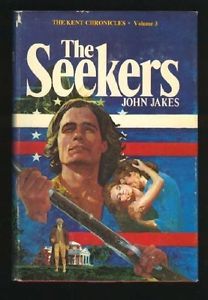
The Seekers is a historical novel written by John Jakes and originally published in 1975. It is book three in a series known as The Kent Family Chronicles or the American Bicentennial Series. The novel mixes fictional characters with historical events and figures, as it narrates the story of the United States of America from 1794 through 1814. The novel was made into a television film by Operation Prime Time and premiered on HBO on July 8, 1979.

Aribam Syam Sharma is an Indian filmmaker and composer from Manipur. He debuted in the first Manipuri film Matamgi Manipur as an actor. In 1974, he directed his first movie Lamja Parshuram. It became the first Manipuri film to run for 100 days in the box office. His 1979 film Olangthagee Wangmadasoo was the first ever and the only Manipuri film to run for 32 weeks. It also broke the local box office records of Sholay.

Village People is an American disco group known for its on-stage costumes and suggestive lyrics in their music. The group was originally formed by French producers Jacques Morali and Henri Belolo and lead singer Victor Willis following the release of the debut album Village People, which targeted disco's large gay audience. The group's name refers to Manhattan's Greenwich Village, with its reputation as a gayborhood. The characters were a symbolic group of American masculinity and macho gay-fantasy personas. As of January 2020, Willis is the only original member of the group.

Upendra Jethalal Trivedi was an Indian film and stage actor, director and producer who was one of the most prolific actors of Gujarati cinema. As an actor films like Mehndi Rang Lagyo (1960), Jogidas Khuman (1962) were few of his earliest appearances in Gujarati films. He was also known as Abhinay Samrat. He was politically active and was elected to the state legislative assembly three times.
Navaneetham Padmanabha Seshadri, popularly known as N. P. Sheshadri, was an Indian musicologist, scholar, administrator and the founder secretary of National Cultural Organization. He was known for his services for the promotion of Indian culture and heritage. Seshadri was honored by the Government of India, in 2002, with the fourth highest Indian civilian award of Padma Shri
















